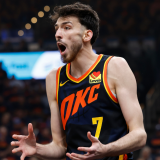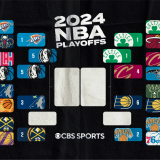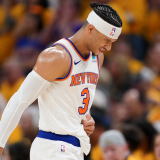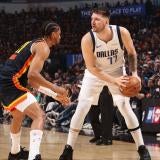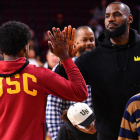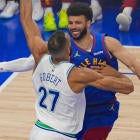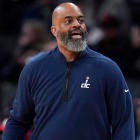Let's set the table here real quick. The NBA has wanted to get back into Seattle since it left in 2007. You can go down the road of why the league left and how shady that entire process was -- check out SonicsGate if you haven't -- but the league has said pretty clearly it still values Seattle as a market, and it wants it to get an arena and get a team back. They just haven't found a team to move.
The Kings were saved by David Stern, likely as a result of Stern not wanting to repeat what happened with Seattle, and the Bucks found new ownership who built a new arena. Seattle has loomed as a real threat to any team that might not pursue what the league perceives as a necessary arena upgrade. Expansion is the only way Seattle's going to get a team, and if they add Seattle, they need to add another team so it's even in both conferences.
The league is currently negotiating with the union on a new CBA, with high optimism on both sides that a deal will get done, sometime before the opt out date in December. Any movement on expansion starts there.
Here's where today's topic of conversation arises. Sonics Rising covers everything regarding the Seattle efforts for a new season and a return of the team that was such a part of the league and city culture. It is not a huge news-breaking site, but it should be noted that Kevin Nesgoda -- who writes and edits the site -- doesn't put himself out there with much, and that he did get the Russell Westbrook extension news before anyone else. On Thursday, Sonics Rising published the following, writing that expansion is "on the table" in CBA negotiations and that Seattle, provided it could approve an arena plan, would be at the front of the line:
I've heard that once the CBA is finished, the expansion bidding could be announced as soon as December or as late as the All-Star Game in February. There are going to be numerous other cities competing with Seattle to get the expansion franchises as well. I do not know if there is just going to be one slot or two. Other cities I've heard that are going to be making a play for expansion are Louisville (they have all their affairs in order and ready to go), Pittsburgh, Omaha, Las Vegas, Vancouver, BC, and Mexico City. Kansas City and St. Louis have been brought up as well, but I can't confirm the validity of their interest.
Source: Multiple sources: NBA expansion to Seattle is on the table - Sonics Rising.
Now, before we get into the ideas for possible candidates discussed here, let's be really clear on what Adam Silver said as recently as March:
"The issue with the NBA right now, is every team in essence, can have a global following," Silver said. "The need to expand the footprint by physically putting another team in a market becomes less important from a league standpoint. And therefore, the way the owners see expansion at the moment is really the equivalent of selling equity in the (league).
"We are 30 partners right now. Thirty teams. Each of those teams own 1/30th of all the global opportunities of the NBA. So the issue becomes, if you expand, do you want to sell one of those interests off to a new group of partners? One reason to do it of course, is that if its additive. And no doubt, Seattle is a great market. At the moment, like for me as successful as the league is right now, we (are) not in the position, putting even aside profitability, where all 30 teams are must-see experiences. That's not a secret."
Silver also touched on how expansion could dilute the talent of the NBA.
"There are so many great players in the league," Silver said. "And that's one of the issues with expansion. Even putting aside the financial notion of selling equity and whether if it's additive to the league as a whole to add more teams, the question becomes is it dilutive in terms of talent. And that's something that I'm focused on as well."
Source: Adam Silver talks expansion, issue with NBA team returning to Seattle - CBSSports.com
That was just seven months ago. The league has made it clear it doesn't view it as financially or logistically feasible to expand, and if it did want to expand, it would want to expand its international impact. Then you have to consider the votes necessary to approve those moves and how those efforts break down. If you want to put a team in Las Vegas, for example, that impacts the Kings' market. If you put a team in Seattle, it takes away from Portland's reach (though Blazers owner Paul Allen voted against moving the Sonics and seems like he would support it). If you put a team in Kansas City, that impacts OKC's market, etc.
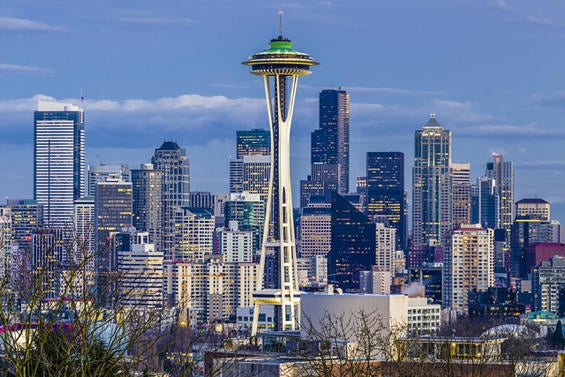
This is why Larry Ellison from Oracle struggled to put together an effort to move into San Jose, because of how it slices up the various California markets. These things have to be considered.
So the odds of expansion, right now, are poor. But with the money that has flooded the system with the new media deal, there's an opportunity. If the league can find a way to convince ownership that they make money with expansion, then it could get approved. That's going to be the real key.
As such, and with a healthy dose of skepticism, here's a look at the teams listed.
Seattle: The Sonics were beloved for 40 years, and the fans want them back, they just didn't want to shell out for a new arena. (Check out John Oliver's bit for the argument against new arenas.) Chris Hansen has been chasing a team for five years. He and his efforts were dealt a huge blow by a city council vote against street vacation for an approved plan this year... so Hansen went out and bought $32 million more in real estate to make another run at an arena plan. This one is a no-brainer for the league, but Hansen has to figure out the arena situation.
Pittsburgh: It's ranked 23rd in television market, and supports both a baseball and football team remarkably well. It would be easy to slot in another East team, and would make for a great combo rivalry with the Sixers. They have Consol Energy Arena, which hosts March Madness games and seats 19,000, just right for an NBA team. Ownership is the question mark here.
Omaha: This is... a little weird. It's the 74th biggest market, and its fan makeup does not suggest it would go all out for an NBA product. I'd say I can't imagine trying to sell an NBA free agent on Omaha, but I would have said the same thing about OKC. It hosts large sporting events (like the College World Series), but it seems like a weird fit for an NBA team. CenturyLink Center has just under 19,000 seats and was built in 2003. It's a little long in the tooth but would do for the short-term.
Las Vegas: Obviously the market is there. After the 2007 All-Star Game did not go over terribly well, there was a lot of talk that the league would never explore it. But under Adam Silver, that could change, especially now that the NFL looks ready to adapt it as a new city. Silver has been welcoming of the idea of sports betting being adapted and integrated by U.S. sports leagues, and they have T-Mobile Arena which just opened this year. If the league thinks it works as a full-time market, this makes a lot of sense as a second city, and then the league would move Memphis or New Orleans to the Eastern Conference.
Vancouver: A return to Canada after how the Raptors have taken off. Media loves the city, and a return is a very popular idea. But they need both an arena (the Rogers Center is 31 years old, which is now considered ancient) and an ownership group. However, it's a wide-open market that doesn't hurt anyone and would re-solidify the Northwest division geographically. There's definitely a fan base still very much into the idea of an NBA return.
Louisville: A popular suggestion for some time, Louisville would help ease the NBA into the southern market, and there's an arena in place with the KFC Yum! Center. But the University of Louisville has a number of advantages in maintaining control of the facility for its events. (Read this chain for reference.) Can a college town adopt an NBA team successfully? Louisville's an intriguing choice with some upside and a building, but it's complicated.
Mexico City: It's complicated, but the league has played regular season games there the past few years. There's an arena, opened in 2012, that seats over 22,000. If they want to expand beyond the United States and Canada, this makes a lot of sense. The dynamics of having a Mexico-based team is something that needs more research, honestly.
Kansas City: They built an arena, thinking they'd lure a team, and then... no team came. They haven't been able to find a serious ownership group with major interest, and that continues to be a problem for a small-market team. KC has dilution of market by the Chiefs, Royals, Sporting KC, and the Kansas Jayhawks, who are hugely popular in the city. (The Missouri Tigers take a smaller share.) The arena, Sprint Center, opened 10 years ago, so it's no longer the sparkling new place it once was talked about being, but it's still in great condition considering how little it's been used beyond concerts.
It's tough to put a fourth professional sports franchise in the 33rd market even with how basketball-crazy the town is as a whole. Sporting KC's success is proof of both how a team that is run well can succeed there, and maybe the very limit of what the market can support.
St. Louis: They just lost the Rams, so there's a gap there, but that also likely makes the market less appealing. Meanwhile, they have an arena, Scottrade Arena, where the Blues play, but it's 22 years old. They need a new one, and fast. Ownership is also a question. St. Louis might welcome an NBA team to fill the hole the Rams left in their collective heart, but not everyone is so sure.
Chicago: This isn't mentioned, but it makes a world of sense. You'd have to pay Jerry Reinsdorf enough to double his beloved White Sox's budget, but if you can get the Hall of Famer on board, Chicago makes the most sense. You need a new arena (the Bulls and Blackhawks can't both share the United Center, which is getting long in the tooth, with another team), and you'd have to find an ownership group. But unlike the other markets here, you know that a second Chicago team would pull profit. The Clippers had the worst team in the league for decades under Donald Sterling (with all his Sterlingness) and still made money because of the L.A. market. Even if the team would always be second to the Bulls, they'd still make bank, and that matters in these conversations.









